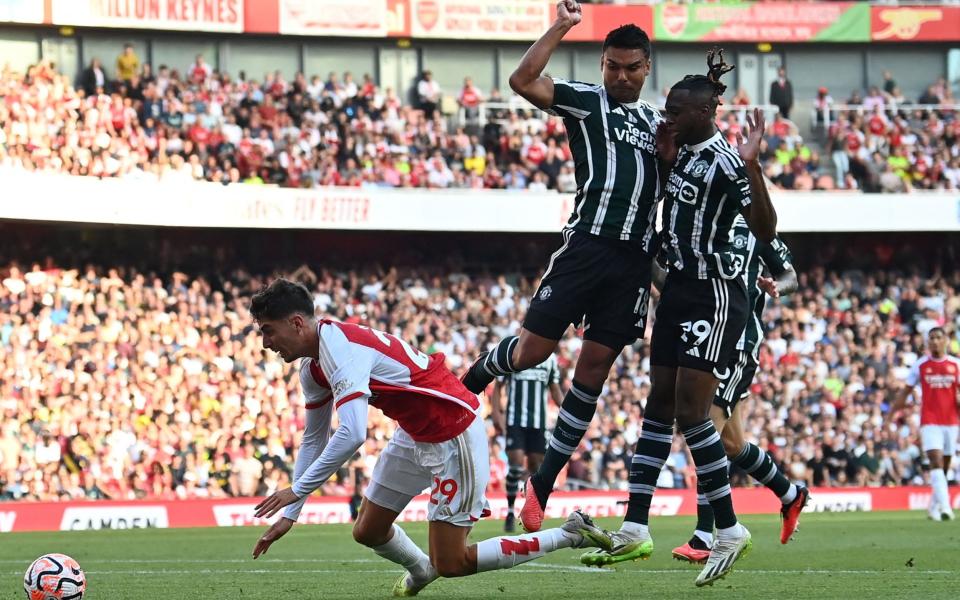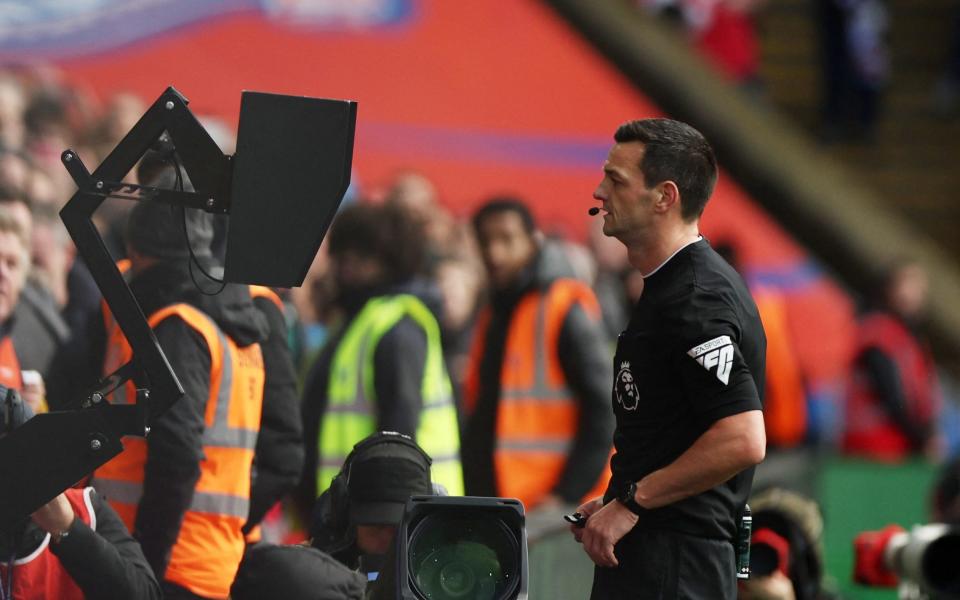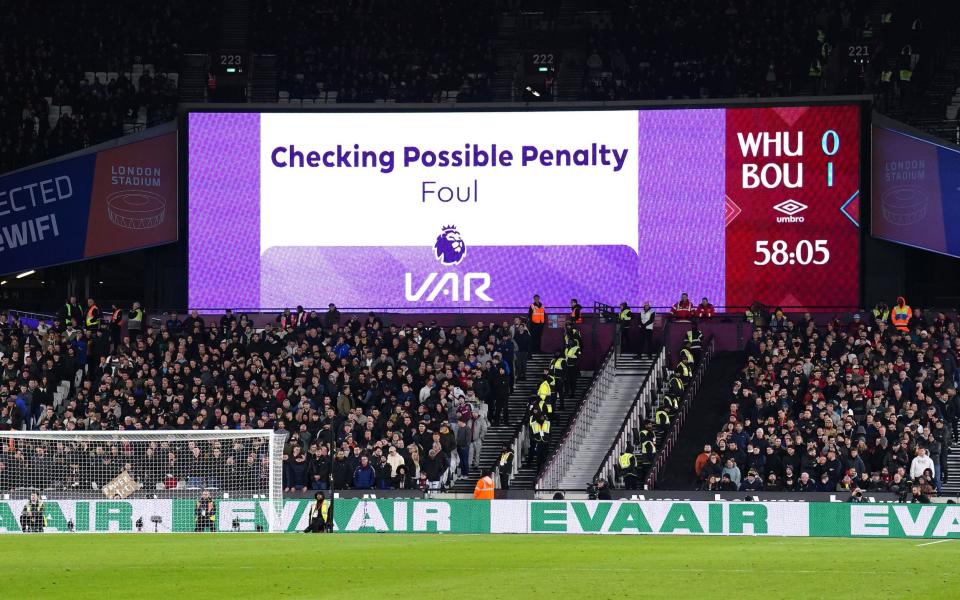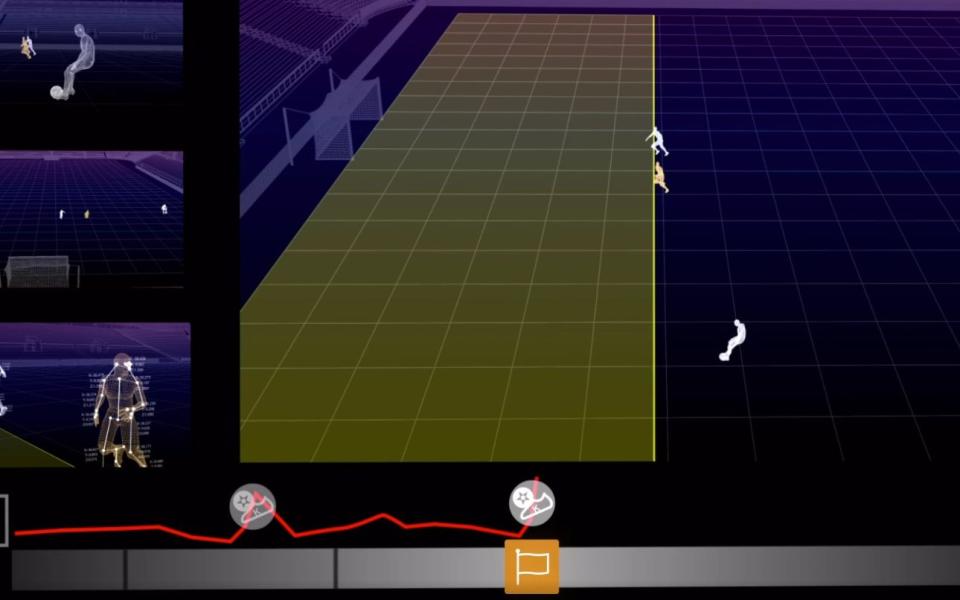The Premier League is calling for VAR reform after checks “take too long” and the fan experience is “not nearly good enough”.
In a candid admission that the technology is “bad” for those involved in matches, Tony Scholes, football’s most senior official, acknowledged that “we have a job to do”.
Scholes fiercely defended refereeing standards but “clearly” accepted that VAR is “not perfect” as he outlined plans to speed up checks and improve stadium communications.
An improvement next season will be that fans will be informed of referee decisions during matches, but only after the VAR process for the issue in question has been resolved.
But the league is frustrated at being ‘restricted’ by the International Football Association’s board [Ifab]the legislative body, on a proposed introduction of live VAR updates.
“It’s not nearly good enough – we know it isn’t,” Scholes said of supporters who complained about being left in the dark this season. “It affects the fans’ enjoyment of the game and we know this has to change.”
Besides lobbying Ifab for better communication, the league’s other major concern is improving decision speed. “The reviews take too long and it affects the flow of the game. We are very aware of that and the need to improve that speed, while always maintaining accuracy,” said Scholes. “We want them through the development of training [the VARs] to make a decision based on the facts they see, without having to double or triple check.”
Managers, captains and club directors will receive surveys this month as the league works to improve technology and legislation in general.
The handball law will be one of the questions, with Scholes revealing how “at our last managers meeting someone asked: ‘We have no idea where we stand on the handball law’.” Then others joined in and supported him.”
However, Scholes argued that the standard of refereeing is as high as ever before and expressed his “disappointment” at clubs who have publicly criticized the league management this season. Arsenal, Nottingham Forest and Wolves have all made their feelings known after controversial incidents.
In a comprehensive briefing detailing the league’s progress on refereeing and VAR ahead of a club shareholders’ meeting in London on Thursday, Scholes also explained how the majority of supporters surveyed by the league “are still in favor of VAR,” with correct decisions increasing from 82 percent to 96 percent since the technology was introduced.
In total, VAR errors have fallen from 25 last season at this stage to 20. Subjectively, VAR has intervened incorrectly twice: the disallowed Burnley goal against Nottingham Forest and an overturned Arsenal penalty against Manchester United.


The only “factual” error made this season was the “significant human error” where Luis Diaz’s goal was wrongly disallowed for offside against Tottenham.
But match length and playing time have both increased by three minutes and 31 seconds, with “officials being stricter on time wasting”. Yellow cards for this offense have risen to 145 from 67 at the same point last year.
Extra playing time has led to 92 goals in extra time this season, 49 more than at the same stage last year. A total of 730 goals have been scored, which equates to 3.2 per match.
The league will also ask other leagues to stop putting pressure on the fixture list. “The calendar is becoming increasingly difficult as other competitions expand,” says Scholes.
The five things the Premier League wants to improve VAR
Referee decision-making in the Premier League is more accurate than ever, but the competition is now readily admitting that VAR still has major problems to solve. While the top layer will question captains, managers and club owners on various matters in the coming weeks, here are the five most important topics on the agenda:
Too many checks and it takes too long
The most common issue cited by players, managers and fans alike was the disruption to the flow of play since the introduction of VAR.
The unrest has reached new heights this season, with one of the longest controls of the season coming in Liverpool’s 2-1 win over Crystal Palace in December. During an on-field review, referee Andy Madley watched 24 replays before ruling a foul had been committed in the build-up to awarding a first-half penalty to the home side. Now in its fourth year of use in England’s top flight, the Premier League admits it is one of two problem areas that lawmakers have yet to resolve.


Tony Scholes, the top level’s chief football official, is not calling for time limits on checks, suggesting instead that the solution will be recruitment and training.
“The basic principle is that we do not want to compromise accuracy,” he says. “We have to take care of that.” However, he admits that “decision times have increased this season” and “that is in addition to increased scrutiny of VAR, in addition to the result of a few high-profile decisions this year”.
One such incident that will have undermined confidence in quick decision-making was the mistake that denied Liverpool’s Luis Diaz a goal against Tottenham last September.
Extra checking adds extra pressure “but through training development we want them to focus on making a decision based on the facts they see, without having to double or triple check,” Scholes said .
VAR audio
Scholes acknowledges that the VAR experience is especially ‘bad’ when you actually attend a match. The solution as far as he is concerned is to lobby lawmakers Ifab to liberalize their rules for allowing competitions to provide live updates on decision-making. Ultimately, he believes video footage of the decision-making at Stockley Park could be broadcast on large screens in the ground.
“They are very clear at this point that we cannot use the audio and we cannot play the audio,” Scholes explained. “My personal view is that we are on a journey, and that will come and we will get to a point where both the video and the audio will be played live and then played back to explain the decision… But we will continue lobby them to get to a place where VAR is open, transparent and informative for supporters and all stakeholders, as is possible. One development that we obviously have to take into account is that the referee will announce his decision to the public on the field after the VAR assessment.”


Doubts about semi-automated offside technology
After being more cautious than other leagues in introducing VAR in the first place, the Premier League now needs to be convinced about auto offside. The Premier League has a contract with Nike and would therefore not be able to adopt the like-for-like Adidas ball chip used at Euro 2024. For the first time, Scholes said he could not guarantee clubs would be able to vote on the introduction of the technology in time for next season. In what he described as a “note” to those demanding its introduction, he said: “First of all, we do not believe this will increase the accuracy of decision-making.” The league is still testing “a number of systems,” he explained, adding that it is “not definitive” that a final decision will be made this year. “We want to be very sure that this will improve the situation and not detract from it in any way,” he added.


Competition calendar
The “very popular topic” being championed by the league in the coming months will be that the fixture list is full, with players facing a season of more than 80 matches with an expanded Champions League, a bigger World Cup and additional tournaments in between. “The feedback from players and coaches has been very clear… we fully support the position that the PFA and the LMA are taking from a player welfare perspective to ensure that all leagues and all authorities are aware of the impact that the calendar has on a player,” he says.
Keeping complaints from managers and clubs internal
In a season where the likes of Arsenal and Nottingham Forest have put pressure on referees with public complaints, the league is keen to buck an emerging trend.
Scholes says it can be “a bit disappointing when clubs go public” as “we are constantly communicating with clubs about referee decision-making”.
This year, the league established an “improvement advisory group with half a dozen club representatives on that group” to address any concerns. There will also be “a major survey among football managers, captains, football directors and executives” this month about, among other things, VAR thresholds and handball.